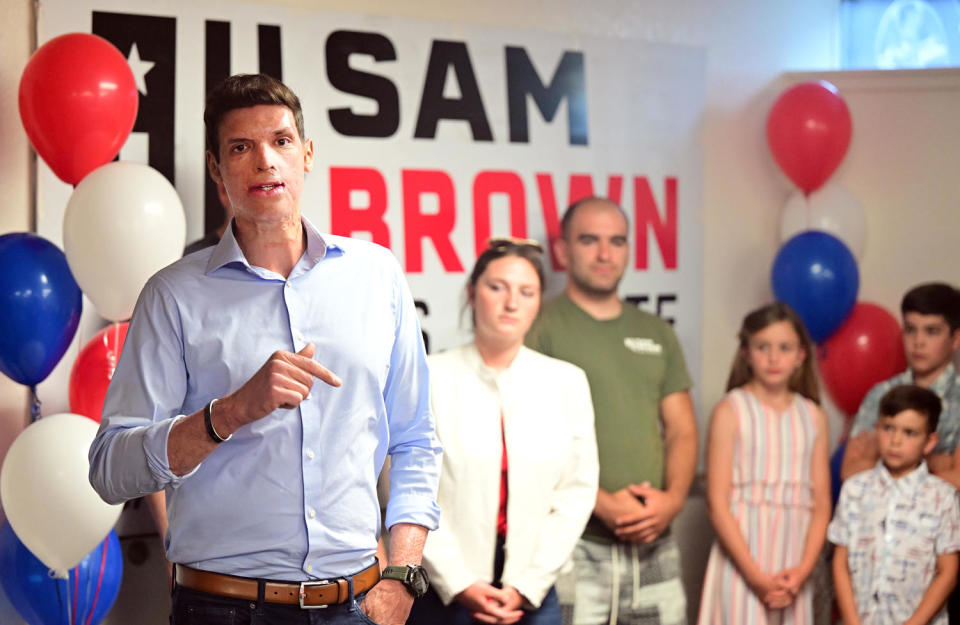GOP Senate candidates soften their abortion stances amid a post-Roe losing streak
Republican candidates in states that will determine control of the U.S. Senate next year have quietly shifted their stances on abortion rights in an attempt to combat Democrats' success running on the issue.
In key 2024 battleground states, some GOP Senate hopefuls have subtly begun to place more emphasis on situations in which abortion should be legal, while others have made clear they oppose a federal ban on the procedure.
The shift in focus comes as Democrats have continued to win elections across the country by forcefully emphasizing their support for abortion rights in the 18 months since the Supreme Court overturned Roe v. Wade. Republican strategists have urged their candidates to oppose a national ban, while party leaders have simultaneously implored them to address the issue head-on.
Democrats say Republicans are trying to soften stances that may have been deeply unpopular with a majority of voters.
“On the record and on video, Republican Senate candidates have already staked out dangerous positions that would make abortion illegal without exceptions — and we’ll make sure voters see and hear them in their own words.” said Nora Keefe, a spokesperson for the Democratic Senatorial Campaign Committee, the party’s Senate campaign arm.
These are the declared Republican candidates in five battleground Senate states who have notably shifted how they publicly discuss the issue in recent months.
Arizona: Kari Lake

Lake — who could end up in a three-way general election against independent Sen. Kyrsten Sinema and Democratic challenger Ruben Gallego — was one of the first and most prominent Republicans to shift her position on the abortion issue.
During her unsuccessful 2022 run for governor in Arizona, Lake said she supported an 1864 law banning almost all abortions in the state — she called it "a great law that’s already on the books" — that briefly snapped back into effect after the Supreme Court’s Dobbs decision.
She now offers a more nuanced position: opposing a federal ban and acknowledging that her own views regarding state policy conflict with some voters’ preferences.
In a statement on her campaign website published earlier this fall, Lake said that while she “wants to do everything she can to help women choose life, to choose to bring that blessing into their own existence,” she “also recognizes that a majority of people in this country and in the State of Arizona hold the view that abortion should be legal with restrictions.”
“Arizona’s law currently allows abortions up to 15 weeks, and Kari does not support a federal ban on abortion. Abortion is, as the courts decided, an issue for states to decide, not the federal government,” her website says. (Lake’s campaign, asked by NBC News to clarify her position, referred to her website.)
Pennsylvania: Dave McCormick

McCormick, who faces little opposition for the chance to run against Democratic Sen. Bob Casey, said at a Republican primary debate during his unsuccessful run for Senate last year that life begins at conception and that "in very rare instances, there should be exceptions for the life of the mother."
Democrats began running ads against McCormick in Pennsylvania featuring those statements this July — two months before he’d even entered the race — prompting his campaign to spend much of its first several weeks clarifying that he had also said that he’d supported exceptions for abortion care in cases of rape, incest and saving the life of the mother.
“As Dave has said numerous times last cycle and more recently, he is pro-life and supports exceptions in the cases of rape, incest, and saving the life of the mother,” said McCormick campaign spokesperson Elizabeth Gregory.
Nevada: Sam Brown

Brown, who is vying to run against Democratic Sen. Jacky Rosen, has described himself as “pro-life” and opposed to “any bill that pushes for federal funding of abortion, late term abortions, or abortion without parental notification” and supportive “of federal judges who understand the importance of protecting life.”
But during his unsuccessful Senate campaign in Nevada last year, he did not rule out supporting a national abortion ban.
“This is something as it stands that would be currently left to the states,” he said during a 2022 GOP primary debate against eventual nominee Adam Laxalt. “But once again, I am pro-life, and if there were any sort of legislation that would come forward I’d want to see that specific language.”
He also declined, as recently as July, to weigh in on whether he would support a national abortion ban.
Responding to requests to clarify his position, however, Brown said that he opposed a prospective federal abortion ban and that any restrictions against care should include exceptions for rape, incest and the life of the mother.
“I have consistently maintained that this issue should be decided at the state level, and the people of Nevada have made their decision,” he said in a statement. “I am personally pro-life, and I believe there should be exceptions for the tragic situations of rape, incest, and where the life of the mother is at risk.”
Ohio: Bernie Moreno, Frank LaRose, Matt Dolan

Businessman Bernie Moreno, one of three Republican candidates seeking to challenge Democratic Sen. Sherrod Brown, has bounced around on the abortion issue.
Moreno has said that “Republicans should never back down from their belief that life begins at conception and that abortion is the murder of an innocent baby.” Earlier this year, in an attempt to define his views on a ballot measure that voters passed in Ohio last month to enshrine abortion rights in the state Constitution, he falsely claimed that the measure would let a rapist “force” a woman to get an abortion.
More recently, Moreno has offered more nuance about his position on the issue at the national level. He said in October that he supports a federal 15-week abortion ban that would include exceptions for rape, incest and saving the life of the mother — but would also want to allow states to issue additional restrictions.
Moreno’s two competitors for the GOP Senate nomination — Ohio Secretary of State Frank LaRose and state Sen. Matt Dolan — have also made their opposition to abortion clear, but don’t appear to have yet backed away from any prior comments.
In August, LaRose told NBC News that “if a pro-life measure comes before the Senate, then I would vote as a pro-life American.”
As a state senator in 2018, he voted for a six-week abortion ban that snapped into effect (but currently remains blocked by a judge) after Roe was overturned. The law does not contain exceptions for rape and incest.
LaRose attracted criticism from abortion rights supporters earlier this year when he acknowledged that an August special election was “100% about keeping a radical pro-abortion amendment out of our constitution.” And last month, LaRose — who as the state’s top election official had final say over the language of the November ballot measure — went even further, admitting that he’d consulted with three anti-abortion groups when drafting the ballot language to describe the measure.
In a statement, LaRose campaign spokesperson Ben Kindel said that LaRose “will always fight for the rights of the unborn and healthcare for women.”
Dolan, for his part, had slammed the Issue 1 ballot measure as “extreme” and has said abortion policy should be left to the states — but has also appeared to leave the door open for supporting federal abortion restrictions.
“The pro-life movement has worked hard to get it back to the states,” Dolan told the Columbus Dispatch in October. “It’s back there, and I would prefer states to deal with it on a state-by-state basis.”
He has also said he wouldn’t support any anti-abortion legislation that doesn’t contain exceptions for rape and incest.
Dolan, however, has said in multiple interviews that he would consider national abortion restrictions if there were an increase in successful efforts, similar to Issue 1, that enshrine abortion rights in state constitutions.
Michigan: Mike Rogers, Peter Meijer, James Craig

Former Rep. Mike Rogers, who is one of several Republicans running for an open Senate seat, has suggested he would not support any federal abortion restrictions if elected.
“Will I go to Washington, D.C., and try to undo what the citizens of Michigan voted for? I will not,” he told the Detroit News in September. Last year, Michigan voters passed a state constitutional amendment guaranteeing the right to an abortion.
But abortion rights supporters have pointed out that Rogers, during his 14 years in Congress, voted at least twice for federal abortion restrictions. That included supporting a bill in 2012 that would have banned almost all abortions (and did not include any exceptions for rape or incest) and a bill in 2013 that that would have criminalized most abortion care in the United States.
Similarly, former Rep. Peter Meijer — who as a member of Congress repeatedly voted against expanding abortion rights — said recently that while he was “proud” of his record of “protecting life,” he acknowledged that “we’re clearly in a different world today after Roe has gone away.”
“I do not support federal bans on abortion, period, full stop,” Meijer told the Detroit Free Press last week, adding that abortion restrictions “will be decided at the state level.”
Former Detroit Police Chief James Craig, who before the Supreme Court’s 2022 ruling had repeatedly said he supported a since-repealed 1931 abortion ban in the state, told the Detroit News in October that he was opposed to a federal abortion ban.
“I think a heartbeat of a child matters. But I’m also sensitive to it being realistic and something that should stay with the states,” he said.
Spokespersons for the Rogers, Craig and Meijer campaigns didn’t respond to questions.
This article was originally published on NBCNews.com

